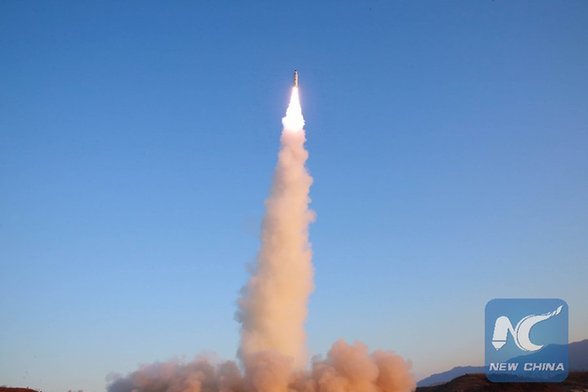Grave concerns that DPRK crisis is getting out of hand
|
 |
|
File photo provided by Korean Central News Agency (KCNA) on Feb. 13, 2017 shows a test firing of a surface-to-surface medium- and long-range ballistic missile Pukguksong-2 on Feb. 12, 2017. [Xinhua/KCNA] |
Unilateral countermoves by individual stakeholders have proven insufficient, and ineffective, in reining in the nuclear weapons program of the Democratic People's Republic of Korea, as its latest missile test on Wednesday demonstrated.
While the accumulative effect of Pyongyang's most recent series of tests has been a hardening of the consensus among the stakeholders that they should come to an end, there is still no well-coordinated collective response to achieve that aim.
The Republic of Korea responded to the latest DPRK missile test with a missile firing of its own within minutes, knowing full well it was a meaningless gesture.
After the launch, the DPRK's state news agency KCNA declared that Pyongyang had now achieved its mission of becoming a nuclear state, calling the weapons a defense against the "nuclear blackmail policy" of the United States. Although analysts suggest such missiles would be unable to hit the US carrying a nuclear warhead, the launch was enough for US President Donald Trump to issue one of his enigmatic statements - "We will take care of it."
Which is worrying. His recent unilateral move to tighten the screw of sanctions - by renaming Pyongyang a sponsor of terrorism - only served to accentuate the belief that his interest in diplomacy is simply for show.
Helpless as he is, ROK President Moon Jae-in is correct in observing the real danger is "the situation could get out of control if North Korea perfects its ICBM technology".
As a key stakeholder in the unfolding confrontation between Pyongyang and Washington, Beijing is in an awkward position, bearing the brunt of the blame for the failure to stop Pyongyang's nuclear missile program, even though that failure has essentially been everyone's, and being criticized for "inaction", which totally ignores the truth.
Beijing wants the two belligerents to calm down as much as anyone. It is vexed that a golden opportunity to build concerted momentum to encourage Pyongyang to engage in talks has been so casually wasted by the Trump administration's recent action of renaming Pyongyang a sponsor of state terrorism, which may have prompted Pyongyang's latest missile launch.
There is a severe trust deficit among the relevant parties that is being repeatedly exacerbated by the actions of Washington and Pyongyang. This, as Kremlin spokesman Dmitry Peskov said on Wednesday, is moving the situation further away from the point where a settlement of the crisis can begin.
Which means the clock is ticking down to one of two choices: learning to live with the DPRK having nuclear weapons or triggering a tripwire to the worst-case scenario. But there is a third choice, which the US keeps ignoring. That is for all stakeholders to genuinely pull together to put an end to Pyongyang's dangerous game once and for all through dialogue and a peace treaty.
To achieve this, as Beijing has consistently argued, requires accommodating the concerns of the various parties and following the proposed step-by-step plan to establish the conditions necessary for dialogue.


















